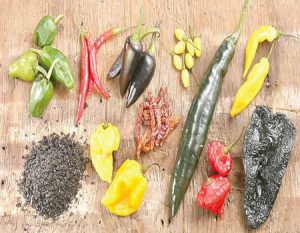Chilli pepper isn’t just hot, it’s a medicine
Don’t smoke, limit calories, don’t drink to excess, get a flu shot every year — those are things that have very convincing evidence will help to live longer. Now, experts have included eating hot food, mainly chilli peppers. Consuming spicy food six to seven times a week, they say can reduce the risk of dying by 14 per cent.
Hot peppers have been around for more than 6,000 years and now they are taking the medical world by storm. They have an array of health benefits and it’s time individuals also tap into them for better health:

Aids weight loss
Research suggests that capsaicin, the ingredient that gives chilli peppers their heat, may work as an appetite suppressant, though only to a minor extent. Canadian researchers who looked at a group of adult men found that those who were served hot sauce with appetizers before a meal went on to consume on average about 200 fewer calories at lunch and in later meals than their peers who did not have anything with capsaicin.
In fact, a preliminary research proposes that adding a teaspoon of cayenne pepper can cause the body to burn an extra 15 calories after eating the meal.
Protects from colon cancer
Researchers at the University of California, San Diego School of Medicine published in the August 1, 2014 issue of The Journal of Clinical Investigation that dietary capsaicin – the active ingredient in chilli peppers triggering a reaction that ultimately reduces the risk of colorectal tumours in intestines of mice.
Natural painkiller
Modern day dermatologists use topical capsaicin to relieve the pain, tingling, numbness, and other unwelcome sensations accompanying diseases as varied as diabetes, AIDS, shingles and arthritis.
In a 2009 review by the Cochrane Library, research said that the transmission of pain messages from the skin to the brain stops with continuous exposure to capsaicin. This is a publication of The Cochrane Collaboration, an international organisation that evaluates medical research.
Prostate cancer
Researchers at the Samuel Oschin Comprehensive Cancer Institute at Cedars-Sinai Medical Centre in Los Angeles found in tests on mice that capsaicin could provoke apoptosis, or programmed cell death, in the cells behind human prostate cancer, the most common cancer among men in Nigeria.
World Health Organisation statistics indicate that the cancer death rates for men and women are significantly lower than they are in countries with less chilli pepper consumption.
Stomach ulcers
A common myth exists that hot peppers cause ulcers and small intestine irritation. Rather, experts found that it can reduce pain arising from stomach ulcer and help to control bleeding in the stomach as well as prevent its occurrence.
A Chinese study published in 1995 in the Journal of Gastroenterology-Hepatology stated, “Our data supports the hypothesis that the chilli used has a protective effect against peptic ulcer disease.” Also, another 1995 study found that capsicum can even protect the stomach lining from aspirin induced ulcers.
Stops breast cancer
New research from the Ruhr University in Bochum, Germany, tested the effects of the spicy molecule on aggressive breast cancer cells type and found it could help to slow a subtype of breast cancer.
In the findings were published in Breast Cancer: Targets and Therapy, they suggested that a compound in chilli peppers might constitute a new treatment approach for this type of cancer.
Prevents colorectal cancer
According to a 2014 study published in The Journal of Clinical Investigation, researchers found that capsaicin activated a pain receptor in mice that reduced tumour development in their gut.
Heart benefits
Red chilli peppers have been shown to reduce blood cholesterol, triglyceride levels, and platelet aggregation, while increasing the body’s ability to dissolve fibrin, a substance integral to the formation of blood clots.
In 2012, a team of nutritionists at the Chinese University of Hong Kong, working with hamsters, found that capsaicin helped break down so-called “bad” cholesterol which might have clogged up the animals’ arteries, but it left alone the “good” cholesterol which helps to remove it.
Clears stuffy nose
The peppery effect of capsaicin stimulates secretions that help clear mucus from a stuffed up nose or congested lungs. A bowl of favourite pepper soup is recommended when one have a cold.
Chilli peppers are a rich source of vitamin C and other antioxidants, and offers protection against colds and flu.
Helps with Type 2 Diabetes
In a study published in the July 2006 issue of the American Journal of Clinical Nutrition, Australian researchers’ show that the amount of insulin required to lower blood sugar after a meal is reduced if the meal contains chilli pepper. When chilli-containing meals are a regular part of the diet, insulin requirements drop even lower.
Cholera treatment
Common spices such as garlic, red chilli and white pepper drastically inhibited cholera toxin production from different strains of the germ that cause cholera.
In 2010, researchers declared in FEMS Microbiology Letters that routine intake of red chilli, which is easily available and inexpensive, may be an alternative approach to prevent cholera.
Hypertension
A study reported in the August 2010 issue of Cell Metabolism, a Cell Press publication that the active ingredient that gives the peppers their heat – capsaicin – also leads blood vessels to relax.
The research in hypertensive rats shows that long-term dietary consumption of capsaicin could reduce blood pressure in genetically hypertensive rats.
